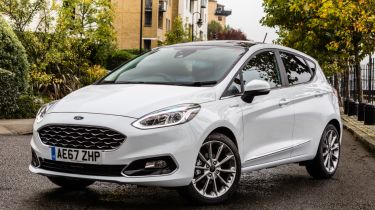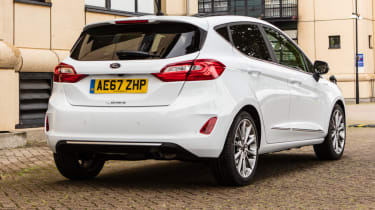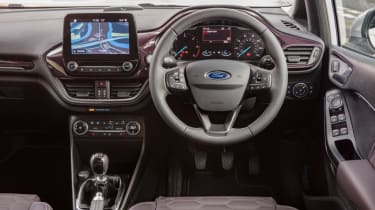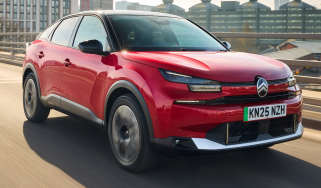New Ford Fiesta Vignale 2017 review
Is Ford’s luxurious Fiesta Vignale a worthy range flagship? We’ve driven one to find out

The latest Ford Fiesta is our favourite supermini right now thanks to its blend of excellent driving dynamics, a greatly improved interior and low running costs. All of those qualities transfer over to the Vignale, but we remain unconvinced that the luxury treatment is worth the extra outlay. A MINI Cooper is cheaper and more desirable, while a Titanium-spec Fiesta represents a better sweet spot between equipment and price.
As Britain’s roads become ever more crowded, the increasing draw of premium small cars isn’t surprising. After all, everybody wants a bit of luxury, but they don’t necessarily want to deal with the dimensions or running costs of an executive saloon or posh SUV.
Ford is looking to capitalise on this with the new Fiesta Vignale. Positioned as the range flagship, Vignale versions of Ford’s Mondeo, Kuga and Edge are already available to buy. The supermini is next in line, and with next year’s set to gain a Vignale variant, too, it’s clear that Ford has high hopes for the luxury sub-brand.
Like the other Vignales, the exterior theme for the Fiesta is lashings of chrome. It surrounds the foglamp units, side windows and bespoke satin-effect grille, while chrome strips run the length of the doors and even the ten-spoke alloys benefit from some shiny metallic treatment. There’s chromed Vignale badges on the wings, bootlid and door sills, too.
It’s enough to make the supermini stand out when parked next to a lesser variant, but whether the treatment is a total success is a matter of opinion. Of course, the Vignale experience does extend beyond some extra visual chintz, with buyers treated to a dedicated lounge in their dealership, plus a ‘Vignale Relationship Manager’ to ensure a higher level of service to that Fiesta buyers will be used to.
Used - available now

2023 Ford
Puma
34,200 milesManualPetrol1.0L
Cash £17,995
2018 Skoda
Kodiaq
89,106 milesAutomaticPetrol2.0L
Cash £14,990
2017 Ford
Fiesta
44,340 milesAutomaticPetrol1.0L
Cash £6,980
2019 Jaguar
XE
80,880 milesAutomaticDiesel2.0L
Cash £8,980The Fiesta’s cabin is also given a lift with quilted Black Ruby leather seats, which along with the steering wheel, are heated as standard. There’s coloured highlights on the dash, too, but although the stitched soft-touch material on the dash top looks like cow hide, it isn’t. It builds on the already generously equipped Titanium X model with a standard panoramic roof, although this robs a noticeable amount of headroom from the rear seats.
An excellent 675-watt Bang and Olufsen sound system also features, as does Ford’s eight-inch SYNC navigation system. Overall, it’s solidly built and sufficiently upmarket to compete with the likes of the Audi A1 and MINI Cooper, but, in all honesty, it doesn’t feel like a significant step above a Titanium-spec Fiesta. That posh leather also serves to highlight some of the scratchier plastics in the Fiesta’s cabin, such as the door pulls and lower dash trim.
Our Vignale test car was fitted with the Fiesta’s most powerful petrol option, a 138bhp version of the 1.0-litre Ecoboost three-cylinder turbo. As we’ve found in other variants it’s a fantastic engine, with strong performance, a willing and flexible feel and notably better refinement than Fiestas of old.
On a motorway trip, fuel economy of 50mpg is within reach, although if you make the most of the performance on offer that figure will drop sharply. In reality, the lesser 123bhp version is similarly fast, fractionally more efficient and £300 cheaper.
Given the comfort bias and extra weight of the Vignale’s kit tally, it’s reasonable to expect that this isn’t the driver’s choice of the Fiesta range. But it’s still one of the best handling superminis on sale. With tight body control, quick and precise steering and loads of grip, it still sets a high class benchmark.
What sets the Fiesta apart from rivals is that it manages to combine all that sportiness with a surprisingly supple, well-damped ride. The only fly in the ointment here is with the optional 18-inch wheels, which add a fidgety edge to the ride not present in Fiestas on smaller rims. Road noise isn’t too pronounced, though; the Fiesta Vignale doesn’t feature the active noise-cancelling tech present in pricier Vignales, but there is some additional soundproofing.
Our biggest reservation concerns the Fiesta’s list price. Finance options will prove more cost-effective for most, but there’s no escaping the fact that, at just under £21,000, this model is £3,000 more expensive to buy than a five-door MINI Cooper. The Ford may have more kit as standard and is almost as good to drive, but in a market where brand image and desirability is one of the biggest draws, the workaday image of the Fiesta makes it a niche choice.











